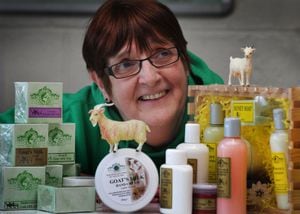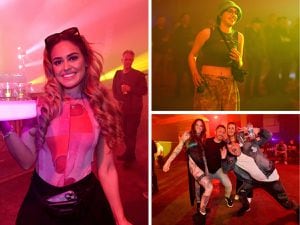Woman: Beauty’s animal magic
In our quest to remain ever youthful, we are turning to animal-based products to help fight the signs of ageing. Heather Large finds out more. . .

We are becoming more savvy than ever about the beauty products we use as we try to preserve our youthful complexions for as long as possible. And around the world we are turning to more and more unusual sources, taking inspiration from both nature and the history books, in the hope of softer skin.
Goat’s milk
Elegance Natural Skin Care, based near Whitchurch in Shropshire, has been making products using goat’s milk since 1985.
Hazel Beddows, aged 53, says: “My mother suffered from psoriasis and found, whilst milking the family goats, that spraying a little of the milk on the affected area helped dramatically to smooth and speed up the healing of her irritated skin.
“The first product the family developed therefore was goat’s milk moisturising cream, which has helped thousands of people worldwide with eczema, psoriasis, rosacea and dry sensitive skin.”
The company was set up by Hazel’s parents Rita and Dave and has grown over the years to employ a total of five staff and two sales reps including Hazel’s husband Simon and 30-year-old daughter Gemma.
They use a variety of natural products including Manuka honey, lavender and avocado.
“It’s quite labour intensive working with natural ingredients but they have so many beneficial properties.
“People nowadays are more interested in what’s going into their creams. Although we’ve been doing it for more than 30 years, customers definitely want to have more natural ingredients,” adds Hazel.
Benefits: Contains precious skin minerals like selenium and is loaded with vitamins, particularly vitamin A and it assists to gently slough off dead skin cells and helps to hydrate and brighten the skin.
Donkey milk
Well-known by the ancient Greeks and Egyptians as a cure for a variety of ailments and an anti-aging skin tonic, this is making a resurgence.
Cleopatra is said to have bathed in donkey’s milk in order to keep her skin radiant and youthful.
These days women can follow in her footsteps by buying a range of different lotions, handcreams and soaps as well as bath soaks.
There are entire companies built around donkey milk, like Donkeys & Co. and Donkey Milk Beauty, which are making it easier than ever to get our hands on this product, which is said to have up to five times more vitamin C than cow’s milk.
But it does come at a price – some donkey’s milk products have a strong aroma which can take some getting used to.
Benefits: Rich in vitamins A,B1,B2,B6,C,D and E and effective against dry skin and wrinkles.
Snail slime
Yep, really. Helix aspersa muller is naturally produced by snails when they regenerate their own shells and skin.
It’s collected from free-roaming snails that are farmed humanely and turned into face creams, serums and gels.
Snail mucus is packed with nutrients such as hyaluronic acid, glycoprotein, proteoglycans, and antimicrobial and copper peptides, all of which are commonly used in beauty products and proven to be beneficial for the skin.
In Thailand, Japan and Korea, there are even snail spas. But forget mani-pedis and hot stone massages, in these spa sessions, living snails are put on the face and left to slither around!
Benefits: It helps to stimulate the formation of collagen and elastin, soothe skin, repair damaged tissues and restore hydration. It can be used to treat dry skin, wrinkles and stretch marks, acne and rosacea, age spots, burns, scars and razor bumps.
Bee venom
Most of us would probably do everything we could to avoid a bee sting. But there are actually products out there containing bee venom that have made a real buzz in the beauty market.
The idea behind it is to trick the skin into thinking it has been lightly stung with the toxin melittin. This causes the body to direct blood towards the area and stimulates the production of the naturally-occurring chemicals collagen and elastin. Thankfully bees are not hurt in the process of collecting their venom. A pane of glass is placed alongside a hive and a weak electrical current is run through it, which encourages the insects to sting the surface.
Because the bee’s lance remains in its body, it does not die. The venom is often combined with Manuka honey.
Benefits: Helps fight the signs of ageing and make skin firmer to leave it feeling completely refreshed and rejuvenated. It’s also said to reduce pigmentation and sun damage.





